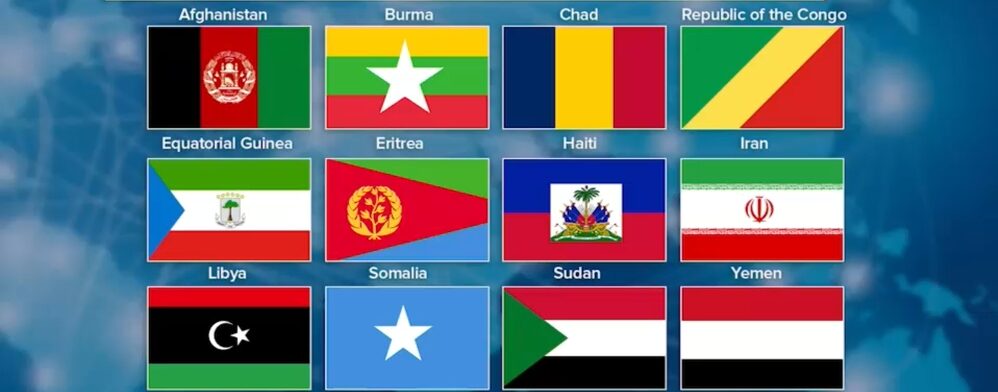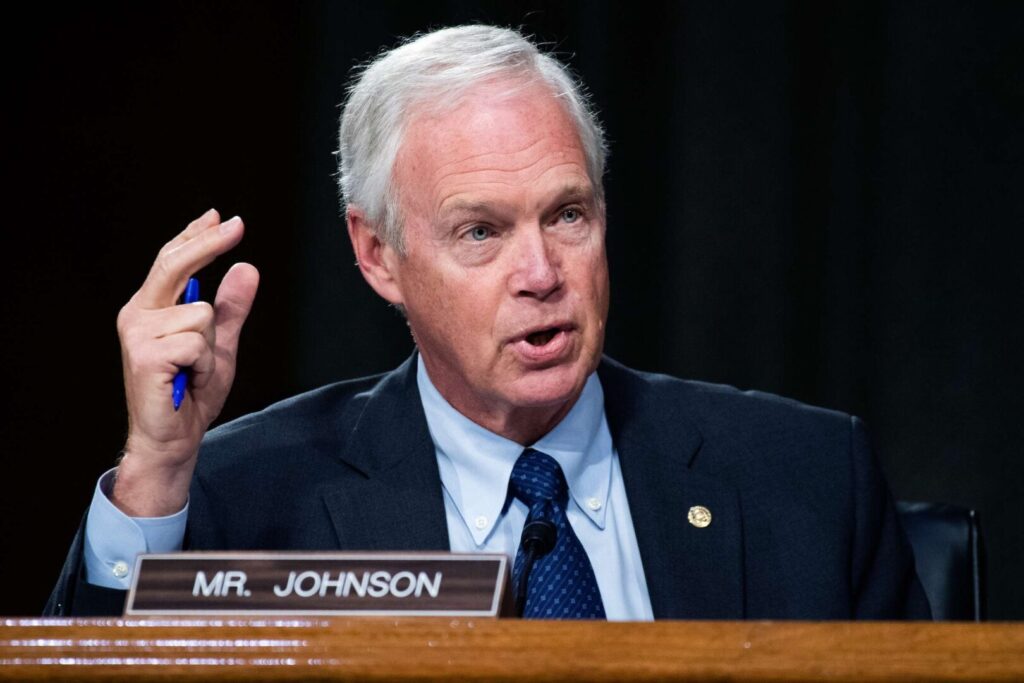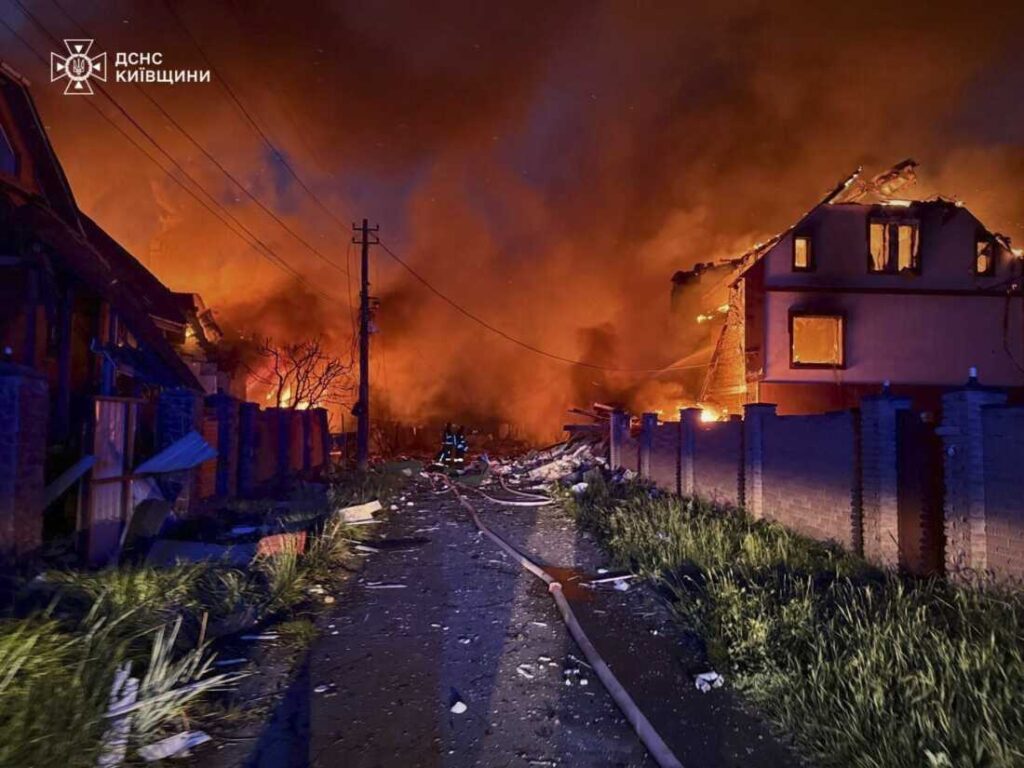On Wednesday, President Trump announced a total travel ban on 12 countries and a partial ban on seven.
Trump said in a video that more countries could be added to the list “as threats emerge around the world.” The move is a play from the president’s first term where he enacted three different bans in 2017 and then another in 202o. Former President Biden rescinded the bans in 2021.
Most of the countries on the list are those who have icy relations with the United States, and more specifically, the White House. Some are governed by those who regained control from the United States at some point in time. The administration also noted that all but four of the countries have a high rate of nationals that tend to overstay their visas.
Although the ban does not target current visa or green card holders, the conversation around visa overstays is picking up steam in the wake of the attack in Boulder, Colorado when an Egyptian national who overstayed his visa used Molotov cocktails on pro-Israel demonstrators. Egypt is not on the list.
Africa
The United States has fully restricted travel for citizens from Chad, Sudan, Libya, Eritrea, the Republic of Congo, Somalia and Equatorial Guinea, the White House announced Wednesday. Partial restrictions have also been imposed on nationals from Burundi, Togo and Sierra Leone.
The U.S. does not typically issue high numbers of visas to those countries. According to State Department data, only a few hundred or a few thousand immigrant and nonimmigrant visas were granted to people from each nation in 2023.
The White House said Somalia was identified as a “terrorist safe haven” led by a government that lacks “command and control of its territory.” This year, the U.S. carried out airstrikes in Somalia targeting ISIS and affiliated groups in a joint counterterrorism effort.
Relations between the U.S. and Sudan have also deteriorated. Last month, the Trump administration announced plans to impose sanctions on Sudan’s military-led government after determining it used chemical weapons last year during an ongoing conflict with a rival faction. The conflict has continued for two years, leaving tens of thousands dead, and the U.S. has so far been unable to broker a ceasefire.
Chad’s relationship with the U.S. has also been strained, with the central African nation demanding the removal of American troops from its territory last year.
Chad was cited for having one of the highest visa overstay rates of any country on the ban list. According to the Department of Homeland Security, about half of the Chadians admitted to the U.S. in fiscal year 2023 overstayed their visas, despite relatively small overall visa numbers. The White House called Chad’s overstay rate “unacceptable” and said it demonstrated “a blatant disregard for U.S. immigration laws.”
In response, Chad’s President, Mahamat Idriss Deby Itno, said on social media that he directed his government to adopt “the principles of reciprocity” by suspending visas for U.S. citizens.
“Chad has no planes to offer, no billions of dollars to give, but Chad has its dignity and pride,” Deby Itno said.
The White House has similarly criticized Eritrea, accusing its military of war crimes during a conflict in northern Ethiopia in 2023.
The State Department has issued similar accusations against state and non-state actors in Libya, alleging crimes against humanity.
The Caribbean
Violent unrest has gripped Haiti for years, with gangs controlling at least 85% of the capital, Port-au-Prince, and launching attacks in the country’s central region. The violence has forced more than 1 million Haitians from their homes, according to local officials and aid groups.
Meanwhile, the United States has imposed new travel restrictions on two other Latin American nations, Cuba and Venezuela, although President Donald Trump stopped short of a complete ban. The move comes a week after the Supreme Court allowed the Trump administration to suspend a Biden-era humanitarian parole program that had permitted up to 500,000 people from the two countries, as well as Nicaragua, to temporarily live and work in the U.S. each year.
Trump in March also ended temporary humanitarian parole for about 300,000 Cubans, citing concerns about record numbers of migrants arriving from the Caribbean island.
Cuba’s Foreign Minister Bruno Rodriguez Parrilla criticized the U.S. travel restrictions Thursday, calling them “racist” and saying they harm “personal, professional, academic, and cultural exchanges” between the two countries.
Venezuelan Foreign Minister Yván Gil Pinto denounced the measures in a statement, describing them as an “operation of hate and stigmatization” targeting Venezuelan nationals.
Of the countries targeted by the new restrictions, the changes are likely to have the biggest impact on Venezuela. The State Department says more than 55,000 Venezuelans were issued nonimmigrant visas to enter the U.S. in 2023, and nearly 800,000 visas have been granted to Venezuelans over the past decade.
The Middle East
The U.S. travel ban announced Thursday targets three Middle Eastern adversaries with which Washington has limited or no diplomatic relations.
One of the countries on the list is Afghanistan, where the Taliban retook control in 2021 following a turbulent withdrawal of U.S. troops under President Joe Biden. The U.S. does not formally recognize the Taliban as the legitimate government of Afghanistan. However, Afghans who supported U.S. efforts during the 20-year military mission in the country are exempt from the ban under a Special Immigrant Visa program that has provided more than 50,000 visas since 2009.
The Trump administration has also singled out Yemen’s Houthi rebels, who have been the target of U.S. airstrikes for several weeks this year. The airstrikes followed attacks by the Houthis on ships and commercial trade routes in the Red Sea. The group currently controls much of western Yemen, including the capital, Sanaa.
Asia
The administration claims that Laos and Myanmar (Burma) have been uncooperative with the United States regarding the return of their nationals.
Myanmar’s ruling military junta has spent the past four years waging a brutal civil war, unleashing waves of violence across the Southeast Asian nation. Columns of troops have torched and bombed villages, massacred civilians, jailed political opponents and forced young men and women to join the army.
The junta is led by an army chief who ousted the democratically elected government of Aung San Suu Kyi and assumed power himself. In March, the country was further destabilized by a devastating earthquake.
Meanwhile, the U.S. and Laos have a complex history marked by heavy U.S. bombing during the Vietnam War. However, the partnership between the two countries is among the most stable and productive of the 19 countries affected by the travel ban.
The full proclamation is available at the White House website.



